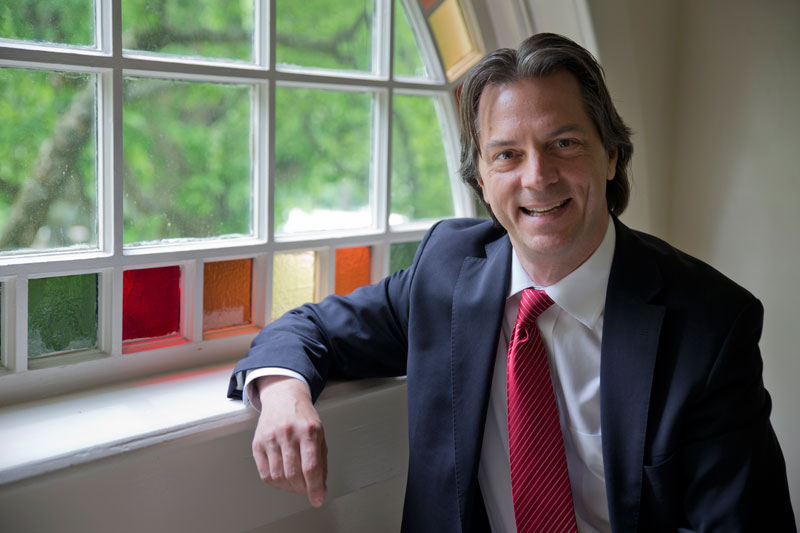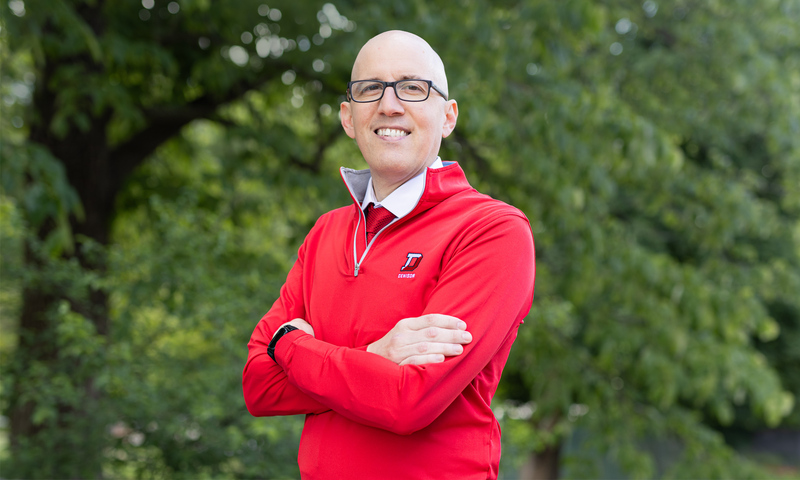To thousands of music lovers, Daniel Meyer ’94 is something of a cultural icon. The conductor and music director has worked with orchestras across the nation, from Portland to Santa Barbara.
So, how does one decide to become a conductor?
“My lightning bolt moment happened here at Denison,” said Meyer, who was back at the college in June 2015 to receive an alumni citation in recognition of his life work.
Meyer had always taken lessons for piano, violin and voice but when he started college he had been thinking about law as a career. A request from Music Professor William Osborne (better-known to Denisonians as WO), who founded and led the Denison Singers, changed Meyer’s direction.
“In the middle of my sophomore year, WO invited me to compose a set of unaccompanied pieces for the Denison Singers reunion. I based them on the Confessions of St. Augustine,” said Meyer. “With that thrilling experience under my belt, I was commissioned to write a set of Cavafy poems in the original Greek to take on tour with the Denison Singers the following spring.”
Then during one rehearsal, Osborne asked Meyer if he liked the way the performance sounded, and invited him to step up to the conductor’s podium.
“It was a moment charged with emotional, intellectual and spiritual challenge for me.”
Meyer recognized his life’s true calling and set aside the political science major he had been pursuing in favor of one in music. And he never looked back.
“Conductors serve as a conduit of energy and emotion between people and the music,” said Meyer. “When I was an assistant conductor with the Pittsburgh Symphony, I watched many of the ‘greats’ come to conduct. I could hear significant differences between performances, and see how the conductors affected their audiences.”
Perhaps surprisingly, unlike conservatory performances, where the conductor spends long hours with the orchestra perfecting a piece before a concert, a professional guest conductor has, at most, four rehearsals with their musicians.
“I do the bulk of my work before I even take up the baton. I explore the piece for difficulties, think about the acoustics, and begin to mold my concept of what the composer was trying to achieve.”
There is no graduate school test for conductor “wannabes,” but Meyer found that his undergraduate musical training served him well when he entered the University of Cincinnati’s master’s program for conducting.
Meyer, who had spent part of his junior year at Denison in Vienna, found himself back in the cultural mecca while earning his master’s. “I took baton technique and score study and was able to soak up all the music in Vienna. It was terrific to revisit that city. I found that my previous time there was really a help in establishing myself and getting comfortable so I could settle down and do the work.”
Currently the music director of both the Asheville Symphony and the Erie Philharmonic, Meyer also is in demand as a guest conductor. He makes three separate appearances in Europe this season, and frequently hops across the country from his home base in Pittsburgh, where he lives with his wife, violist Mary Persin, and their young son, Leo.

